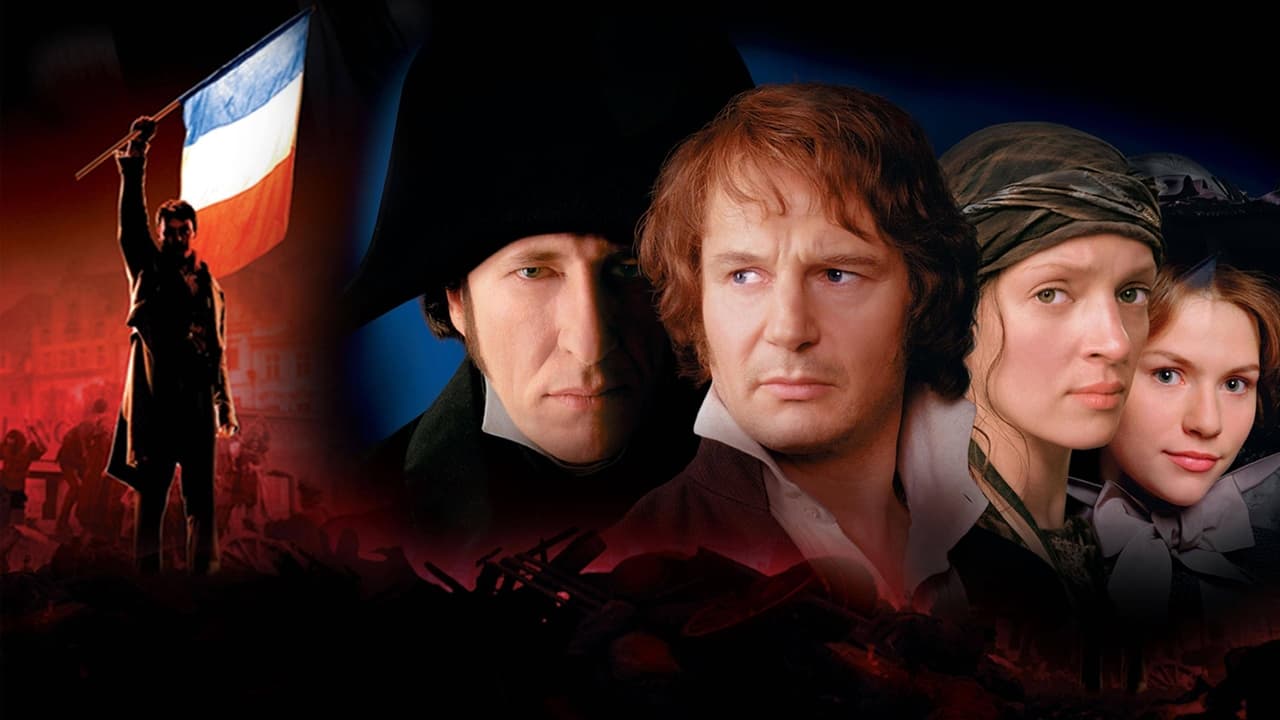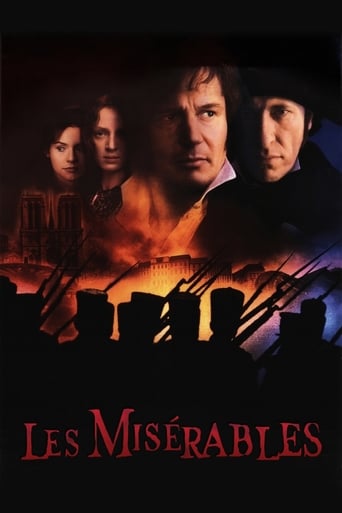Diagonaldi
Very well executed
Platicsco
Good story, Not enough for a whole film
Adeel Hail
Unshakable, witty and deeply felt, the film will be paying emotional dividends for a long, long time.
Kayden
This is a dark and sometimes deeply uncomfortable drama
Elewis1195
I feel neither love nor hate for this version. It was solid, moved at a steady pace, and a respectable amount of tension for a story that we all know how it ends, and was well acted. I missed the heart of the Frederick March version. Liam Neison was, by his own admission, without feeling, and the ending, well, I won't spoil the ending, but I thought it was the weakest point in the film.Overall not a bad revision but not great either.
delriosong
This review contains spoilers Les Misérables is Victor Hugo's classic tale of nobility and self-sacrifice that will have one questioning what man owes society and what society owes man, especially in terms of justice, and finally, what men owe each other. This film is from 1998 and was directed by Billie August. It stars Liam Neeson, Geoffrey Rush, and Uma Thurman. With source material of this nature one expects a lot and this doesn't disappoint in any way. Les Misérables is a large film that tells a large, decades -long story.Let's just break this film down by the numbers and let the chips fall where they may: A) Plot -- the story of Jean Valjean and his struggle to live free is a timeless classic -- 10 B) Characters -- the Characters are fully realized, well-motivate and very believable -- 10 C) Acting -- Liam Neeson and Uma Thurman give excellent performances and none are lacking -- 8 D) Script -- a very good adaptation which moves the story forward well while providing plenty of detail and background -- 8 E) Direction -- interesting and epic shot selection helped convey the scope of the story -- 8 F) Cinematography -- beautifully and artistically shot -- 9 G) Editing -- conventional editing techniques aided the narrative and cinematography/shot selection -- 8 H) Production Design -- Seemed very much like the period with lots of attention to detail -- 8 I) Costume Design -- Realistic but boring, it might have been preferable to have stylized costumes with a little more to look at -- 6 J) Stunts -- Could have done a little more -- 6 K) Special & Visual Effects -- The armed fighting was too short and featured a lack of intensity that additional special effects could have aided -- 5 L) Music -- sweeping in scope, like the film --8 M) Sound -- strong and clear -- 8 N) Entertainment Value -- 9 Average 7.928, call it an 8. Pop some corn, melt some butter and enjoy.This film features violence from civil unrest with the deaths of many including a child, violence against a woman and adult themes. It is rated PG-13.
ThatMOVIENut
One of many versions of Victor Hugo's iconic epic, this late 90s version sees Liam Neeson as Jean Valjean, a 19th century convict who is given a chance for redemption, despite the persistence of the law-obsessed Inspector Javert (Geoffrey Rush), when he must raise the child of the lowly Fantine (Uma Thurman), Cosette (Claire Danes), amidst various changes and turmoils in France, culminating in the student revolt in Paris.While its ending will have Hugo purists boiling with rage, Bille August's adaptation still manages to be a very fine film in its own right. Its immediate strength is its all star cast's great performances, especially Rush and Neeson in the two central roles, playing off each other perfectly as the kind hearted Valjean and the ruthless Javert. Thurman, following 'Batman & Robin' and 'The Avengers', does make up for it here with a nuanced and kindly performance as Fantine, while Danes' Cosette, though a little more bitchy than other versions, still conveys that sense of goodness and hope that is so central to the character.Production-wise, it's exactly what you'd expect. August' direction is sweeping and large, enhanced by design work and location filming that does make you believe you are looking at early 19th century France, and in the midst of horrid prisons and bloody street battles during the revolution. Veteran master Basil Poleadours' score is also nicely varied, going from booming and romantic, to intimate and sombre as we journey with Valjean as he reclaims his life.Rafeal Yglesias (the same man behind the great screenplay for Peter Weir's 'Fearless') does a workman like job of adapting and condensing the notoriously thick book, mainly focusing on Valjean's journey here and dialing back on a lot of the socio-political commentary of Hugo's work. This is a double edged sword, as it does permit more than a handful of genuinely emotional moments that tug at the heart without being too sappy, and focuses the story more around Valjean and his quest for redemption, but it also means that most of the supporting cast are cut or severely reduced (the Thernadiers are on screen for a few moments, and Marius and Enjorlas get collapsed into one character, among a number of other changes) and again, a lot of the bigger ideas in 'Les Mis' are more in the background. And well, the ending is going to irk purists, which is all I'll say.But despite that, this more base take on 'Les Mis' still worked as an engaging period drama with really tight pacing and a good emotional undercurrent. It may not be definitive, but it is entertaining
TheLittleSongbird
The book is a mammoth and hugely detailed one, so it is inevitable that things would be missed out and that it wouldn't be word for word, Victor Hugo's writing is far too rich for that. Even if the details are missing or changed around the spirit of the source material is welcome(though I try not to be a "purist, I have always believed in judging things on their own merits), something that the second half of this film doesn't really do. It is not an awful film, there are a lot of impressive things but it didn't entirely work and fares the weakest film version of Les Miserables.It is very beautifully shot and the costumes, settings and scenery are authentic(at least it doesn't look too clean) and very easy on the eye, so it is a very well-made film. Basil Poledouris' music score is as stirring and hauntingly beautiful as is characteristic of him and his other scores like Conan the Barbarian and Hunt for Red October. Billie August at least directs with style and pace without being too flashy or dull, though it's the kind that gets the job done admirably but passion-wise rather lukewarm. There are three excellent performances as well.Liam Neeson commands the screen as he always does and gives a real nobility and dignity to Valjean, with an effort in the first half to make him compassionate, the second half doesn't allow for him to go into as much depth as it could and should but Neeson, the great and conscientious actor he is, gives it his all. Geoffrey Rush's Javert is ruthlessly cold and authoritative, yet there is signs of a tortured soul too which stops Javert from being too one-dimensional. On paper, Uma Thurman seemed all wrong, on film she is a deeply moving Fantine(even perfectly fitting the role physically) and of the adaptations her Fantine is one of the better developed ones. Peter Vaughn is appropriately kindly as the Bishop,and young Cosette is adorable. The first half was excellent to me, fidelity to the book is strong, Fantine's plight is very tragic and poignant and Valjean and young Cosette's escape from Javert and to the Convent does have a tension to it.Unfortunately the second half doesn't maintain that promise, the production values, music and Neeson and Rush's performances are still top drawer, but Claire Danes, the characterisation and the ending are off. Claire Danes I found terrible as Cosette, she is both a spoiled brat/rich girl and completely bland(it's like her Juliet from Baz Luhrmann's Romeo and Juliet again) and her pouting is annoying. Hans Mattheson fares a little better but not much, he has the looks but he is stiff and tries too hard, also coming across as a rather wimpy leader for the barricade. The ending has no emotional impact whatsoever and is very abrupt, if you have not read the book or seen the musical you will be asking why Javert committed suicide, in fact this is the sort of adaptation that evokes more questions than answers. Most of the lines in the script are true to period and don't resort to cheesiness or awkwardness, but characterisation is very thin here, with perhaps the exception of Fantine and her chemistry with Valjean.You never really see why Javert is pursuing Valjean in the first place and why he continues to do so(those familiar with the source material will do but others won't, did the script-writers think that everybody knows the book or something?). Cosette and Marius' relationship is very shallow and seems to be focused on too much(if Eponine was intact there definitely would have been much more depth), Javert has moments where what he does contradicts what he stands for(especially at the end) and Valjean has moments like at the end and when he's hitting people around where he doesn't seem to have changed or still show signs of being immoral(or better put, finding that goodness doesn't come easy to him) which renders Javert's suicide meaningless somewhat. In the end, because of the lack of depth it is the case of not caring for the characters or not getting to know them. The story is powerful, tense and poignant in the first half but feels underdeveloped and without any true passion in the second half, the barricade just doesn't have the impact.Overall, not a bad film because the first half is strong and those who people would have seen the film for in the first place likewise, but the second half made it a disappointing one. On its own, while under-characterised and with a bad ending, it is relatively decent but adaptation-wise there's much better like the 1934 film. 5/10 Bethany Cox

